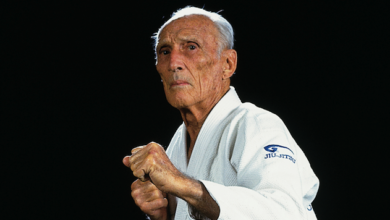Gichin Funakoshi: The Father of Modern Karate
Experts: Gichin Funakoshi (November 10, 1868 – April 26, 1957), born in 1868 in Okinawa, Japan, is revered as the “Father of Modern Karate,” a title he earned through a lifetime of dedication to the martial art. His pivotal role in popularizing karate on mainland Japan, coupled with his distinctive philosophy and innovative teaching methods, not only transformed karate into a respected martial art worldwide but also laid the foundations for its modern practice.
Philosophical Foundations
Funakoshi’s approach to karate was deeply philosophical. He believed that karate was not just a means for physical combat but a path to self-improvement and moral perfection. This philosophy was encapsulated in his “Twenty Precepts of Karate,” which emphasized humility, respect, restraint, and a sense of calm.
These principles, which drew heavily on Confucian and Zen Buddhist ideologies, aimed to develop a balanced character in his students, emphasizing that “the ultimate aim of karate lies not in victory or defeat, but in the perfection of the character of its participants.”

Teaching Methods
Funakoshi’s teaching methods were revolutionary. He modified the traditional Okinawan karate techniques to make them more suitable for training in the Japanese dojo system. This adaptation was not only physical but also pedagogical. He introduced the “dojo kun,” a set of five training precepts that reinforced moral and ethical lessons during training sessions.
His emphasis on kata (formal exercises) as a way to practice perfect form and technique rather than mere physical strength was a departure from earlier practices that focused more on direct combat techniques.
Introduction to Mainland Japan
Funakoshi’s role in introducing karate to mainland Japan was instrumental. In 1922, he was invited to Tokyo to demonstrate karate at the First National Athletic Exhibition in Tokyo, organized by the Ministry of Education.
This demonstration was pivotal; it introduced karate to a wide audience of educators and martial arts enthusiasts in mainland Japan, a critical step that helped karate gain recognition as a serious and disciplined martial art rather than merely a form of self-defense.
Following this successful demonstration, Funakoshi decided to remain in Tokyo, where he established the first Shotokan dojo, which became the headquarters for his style of karate teaching.
Legacy and Impact
Through his efforts, Funakoshi laid down the framework for what would eventually be known globally as Shotokan karate. His focus on spiritual and philosophical growth, along with rigorous physical training, attracted many followers and led to the establishment of karate clubs at several major Japanese universities, which further helped spread his teachings.
The establishment of the Japan Karate Association (JKA) in 1949 under his guidance ensured the structured growth and dissemination of his techniques and philosophies.
The legacy of Gichin Funakoshi is evident in the global respect and widespread practice of karate today. As the “Father of Modern Karate,” his life and work continue to inspire millions of practitioners around the world, cementing his place not only in martial arts history but also in the cultural fabric of Japan. His philosophical teachings and innovative techniques have ensured that karate is more than just a sport or martial art—it is a way of life.




